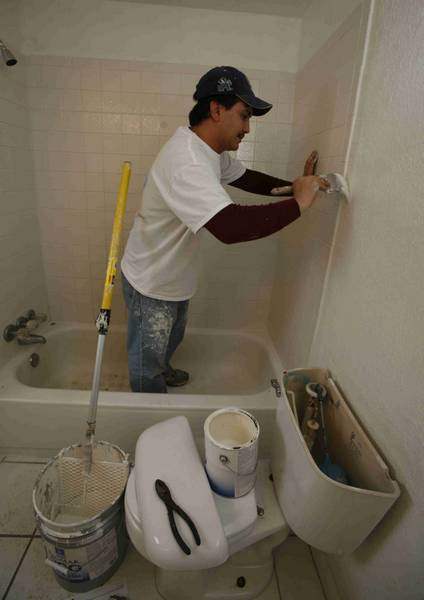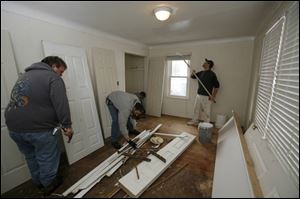
'Distressed' but desirable
12/25/2005
Daniel Boyle paints a bathroom in the house.

From left, Chuck Bennett, Bob Gerber, and Ed Matuszynski tackle a bedroom of a 'distressed' house owned by Juscot Realty.
As he approached his upper 80s, lifelong bachelor John Rosettie wanted out of Toledo's central city and the home he had shared with his unmarried sisters from the 1930s until their deaths.
The biggest obstacle was finding a conventional buyer for the place in an older neighborhood where poorly insulated houses are expensive to heat and even harder to sell.
Ultimately, the house was bought for $8,000 by an investor who specialized in buying and fixing up "distressed" properties, Lucas County records show.
The problem faced by Mr. Rosettie, who died last year at 91, is commonplace in Toledo, with its large stock of older homes and neighborhoods scarred by middle-class flight from inner-city poverty and problems.
But in recent weeks, one of the biggest buyers of such properties suffered a major setback. John Ulmer, the controversial business executive whose "I buy houses" marketing campaign helped him amass a multimillion-dollar real estate and investment empire, was accused by state regulators of violating Ohio securities laws. A court appointed receiver has taken control of his Westhaven Group.
So, with the sidelining of Mr. Ulmer - who was buying and selling up to 150 houses a year - will sellers like the late Mr. Rosettie be stuck with houses they can't sell?
Not according to people specializing in the field, who say there will be no shortage of buyers at the steeply discounted prices for which most distressed houses sell.
"There are plenty of buyers," said Scott Sutter, whose Juscot Realty Ltd. buys and sells about 100 properties a year in the Toledo area. His firm, which also is involved in property management and sales, rehabs houses "in the high end, middle of the road, and low end," said Mr. Sutter. The firm employs four repair crews.

Daniel Boyle paints a bathroom in the house.
The practice of buying, fixing, and quickly selling homes is known as "flipping," although people involved object to the term because sometimes it is linked to shoddy business practices.
When John Ulmer began buying houses locally in the early 1980s, he was something of a pioneer.
So called "handyman specials" had been a staple of the local real estate scene for years. And there was no shortage of buyers - usually skilled carpenters or jacks-of-all trades who renovated a few such properties a year and either sold for a profit or kept as rental units.
But Mr. Ulmer was among the first locally to do this on a large scale.
However, neighborhood groups over the years accused him of sometimes making only cursory repairs and then re-selling houses at unfavorable financing terms to people who were unable to keep up with payments.
He disputed the claims. But 25 years after Mr. Ulmer got his start, the industry has grown up.
An A&E network reality series, Flip this House, recounts the exploits of a firm that buys and sells dilapidated houses in Greenville, S.C. The Internet is full of advertisements for firms trolling for "ugly houses."
Locally, a real estate investors groups has 300 members, many of whom specialize in buying, fixing, and selling houses.
Meanwhile, HomeVestors of America Inc., a Dallas firm that bought 6,000 houses nationwide in 2005, is seeking Toledo fran-chisees to expand its reach to northwest Ohio.
Ohio is a strong market for the firm, which has a 250-franchisee network that includes Cincinnati, Columbus, Dayton, Akron, and Canton, said spokesman Monica Feid.
The firm's motto is "We buy ugly houses." Sellers sometimes contact the firm seeking a quick transaction after a divorce or "when they've inherited their grandmother's house that hasn't been touched in 100 years," she added.
Other situations involve people who have recently moved into nursing homes and want to dispose of houses in older neighborhoods where sales are slow, said Anna Mills, president of the Toledo Real Estate Investors Association.
In looking for properties, investors often seek out real estate agents hired by banks and credit unions that have acquired houses after foreclosure sales, she added.
Other common sources are homeowners who are unable to keep up payments, or other investors seeking to exit the industry, investors said.
Investors snap up many homes for $20,000 or less, but purchase prices go to $100,000 and more.
Although the association president agreed that plenty of investors are scouting for properties in the Toledo area, she pointed out that housing sales overall have slowed locally.
"There are more homes on the market than I've seen in 30 years," said Ms. Mills, a sales agent who operates a real estate investment firm called Mills Run Properties, Toledo.
Investor Sue Hicks said that many investors locally are small-time like her and business partner Al Turski. "Anymore, we do one or two houses a year," she said. "Rehabbing is a lot of work, and we do most of it ourselves."
Even though Mr. Ulmer's problems with the state are linked to the investment side of his business and not to home renovation and sales, Ms. Hicks said she suspects some investors will be discouraged by his predicament.
Such investors have taken heat over the years because community activists sometimes complain that they take advantage of buyers.
Concerned about their image and attempts in state legislatures around the country to enact restrictions on their business in response to abuses, rehabbers have banded together to form the National Association of Responsible Home Rebuilders and Investors.
"We're not saying the industry is 100 percent pristine," said John Grant, executive director. "But instead of being reactionary, let's find out the extent of the fraud and come up with legislative solutions that address specific actions. "
Negative publicity hasn't discouraged people from entering the business.
An average of 300 people attend meetings of the local real estate investors group, although some are merely dipping a toe into the water and may never make a purchase, members said.
Dave Czajka foresees no shortage of buyers interested in distressed houses at the right price. "There's enough people out there," said the Toledo investor, who plans to look at any Ulmer properties that come on the market.
He typically buys and renovates one to three houses a year, and does most repairs himself.
When he sells, it is usually to existing tenants on "rent-to-own" contracts. Income generated by the business has enhanced the retirement of the 68-year-old former elevator-manufacturing worker.
He said he does appropriate repairs.
"I get them up to snuff. If they're not ready for me to move into, they're not ready for a tenant or to sell."
Thomas Weissenberger, a Toledo attorney who represented Mr. Rosettie and a local nursing home that is often faced with the challenge of selling elderly residents' homes, argued that investors like Mr. Czaj-
ka perform a community service.
"We get a lot of houses where you ask yourself, 'What do we do with it?'●" the lawyer said.
"These houses are in distressed neighborhoods. They're not very well insulated. The utility bills are horrendous. They're worth about $10,000. But you sell it to [an investor] for anything he'll give you."
Although complete renovation may not be feasible because of surrounding property values, buyers improve the houses for rental or re-sale to the point where they are habitable, he said.
Contact Gary Pakulski at: gpakulski@theblade.com or 419-724-6082.